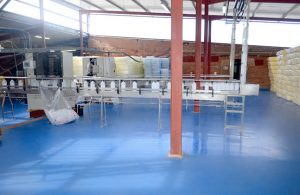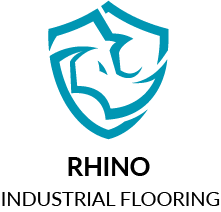Cheese and Dairy Flooring refers to the flooring systems specifically engineered to meet the rigorous demands of cheese and dairy processing facilities. These specialized environments necessitate flooring solutions that prioritize impeccable cleanliness and safety and address the distinct challenges associated with the production and handling of dairy products.

In this introductory overview, we will delve into the unique characteristics and considerations of Cheese and Dairy Flooring, highlighting its pivotal role in maintaining the integrity of dairy production processes and ensuring adherence to stringent industry regulations. From slip resistance to ease of cleaning, these floors are tailored to create a sanitary and efficient workspace in cheese and dairy production.
Importance of Cheese and Dairy Flooring
The importance of cheese and dairy flooring cannot be overstated, as it plays a crucial role in the overall efficiency, safety, and cleanliness of dairy processing facilities. Primarily, such flooring systems must withstand the aggressive conditions of dairy production, including exposure to corrosive substances, thermal shock from variable temperatures, and heavy machinery traffic.
These flooring solutions contribute to maintaining high hygiene standards, a critical requirement in the food production industry. The seamless, non-porous surface of materials like resin, urethane concrete, or polyurethane screed inhibits bacterial growth and makes cleaning processes more effective, thus reducing the risk of contamination.
In addition to its practical qualities, cheese and dairy flooring can enhance the facility’s aesthetic appeal with visual elements that reflect the nature of the business, creating a cohesive and engaging workspace.
Cheese and Dairy Flooring Materials
The beauty of cheese and dairy-themed flooring lies in the clever use of materials to mimic the look and feel of dairy products. Various materials are used to create a cheese and dairy flooring effect.
Urethane Concrete Flooring
The concrete flooring, often called cementitious urethane flooring, has proven to be an exceptional choice for cheese and dairy flooring. Urethane Concrete Flooring is particularly suited for use in wet food environments. Its high thermal shock and slip resistance make it ideal for dairy factories. This type of flooring is renowned for its durability, resistance to harsh conditions, and ability to withstand the corrosive substances found in dairy production.
The flooring also has excellent thermal shock resistance, crucial in environments where temperatures can fluctuate rapidly, such as in a dairy factory. The unique texture of urethane concrete can be manipulated to mimic the appearance of cheese, adding a layer of appeal to this practical flooring solution.
Resin Flooring
Resin flooring is another excellent choice for cheese and dairy-themed flooring. Made from a combination of synthetic materials, resin flooring offers a high degree of customization in terms of color, texture, and pattern, making it perfect for creating the illusion of various dairy products.
It is highly resistant to abrasion, chemicals, and heavy traffic, making it durable and long-lasting. In the context of dairy factories, resin flooring is quick and easy to clean, maintaining a high standard of hygiene, which is paramount in food production environments.
The seamless nature of the material also allows for exceptional hygiene standards, as there are no gaps or cracks for bacteria to harbor. Indeed, resin flooring offers both aesthetic appeal and practical benefits, making it a worthy consideration for cheese and dairy-themed flooring.
Polyurethane RT or HF Screed Flooring
Polyurethane RT (Resin Trowel) or HF (Heavy-Duty Flowable) screed flooring is another feasible option for cheese and dairy-themed flooring. Known for its high mechanical strength and durability, this flooring is ideal in areas subjected to heavy traffic or extreme conditions. It boasts exceptional resistance to abrasion, impact, and chemical substances commonly found in dairy production.
The RT or HF screed flooring can be customized to replicate the look of various dairy products, adding a unique touch to the environment. Moreover, the seamless finish of this flooring type makes it easy to clean and maintain, which is essential in preserving hygiene standards in food processing factories.
Its excellent thermal shock resistance makes it popular for environments with variable temperatures, like dairy factories. As such, Polyurethane RT or HF screed flooring is a versatile and practical solution for those seeking a combination of functionality and thematic aesthetics in their flooring.
Factors to Consider When Choosing the Right Cheese and Dairy Flooring Material
When choosing the right cheese and dairy flooring material, there are several factors to consider.
Hygiene
Hygiene is a paramount consideration when selecting cheese and dairy flooring material. Given the nature of food production facilities, the flooring must be easy to clean to maintain the highest level of sanitation, minimizing the risk of bacterial growth and contamination. The material should resist absorbing moisture, chemicals, and food particles.
Seamless floors, like resin or urethane concrete, are a top choice as they lack crevices where germs can thrive. Regular cleaning and maintenance should also be straightforward to uphold the stringent hygiene standards required in the dairy industry.
Anti Slip
To ensure the safety of employees in cheese and dairy production facilities, it’s essential to account for the slip resistance of flooring materials. Environments where liquids are frequently spilt or condensation and temperature fluctuations are common can quickly become hazardous if the flooring does not have anti-slip properties. Urethane concrete, resin flooring, and polyurethane RT or HF screed flooring offer excellent slip resistance, reducing the risk of accidents.
It’s crucial to consider the specific needs of each area within the facility when making a choice, as certain sections may require a higher degree of slip resistance than others. Therefore, evaluating slip resistance should be an integral part of the decision-making process, contributing to the overall safety and efficiency of operations in cheese and dairy factories.
Anti Microbial Properties
Selecting a flooring material with anti-microbial properties is another critical factor in cheese and dairy production facilities. These environments require high sanitation standards, and the flooring can significantly prevent the spread of bacteria and other microorganisms.
Materials like urethane concrete, resin flooring, and polyurethane RT or HF screed flooring are known for their antimicrobial properties, which can inhibit the growth of bacteria and molds. These flooring types create a non-porous, seamless surface without breeding room for microbes.
Some flooring solutions are also available with added biocides, offering an extra layer of microbial protection. This feature ensures employees’ health and safety and contributes to the quality of the dairy products produced. Therefore, anti-microbial properties are crucial when choosing the right flooring for cheese and dairy facilities.
Conclusion
Whether you’re in the cheese and dairy business or simply looking for unique and sustainable flooring options for your home, cheese and dairy flooring has something to offer. The specific needs of your business or household when choosing the suitable material, and always consult with experts for proper installation. Add a touch of cheese and dairy to your flooring and enjoy its many benefits for years. If you’re considering a renovation project, think outside the box and consider incorporating cheese and dairy flooring into your design.
FAQ’s
Is cheese and dairy flooring expensive?
It depends on the type of material chosen. Vinyl and laminate are relatively affordable, while others, such as cork or reclaimed wood, may have a higher price point.
Can I DIY cheese and dairy flooring installation?
For any flooring installation, it’s always best to consult with professionals to ensure proper installation and avoid any issues. Some homeowners may succeed with DIY projects, particularly vinyl or laminate flooring.
Is cheese and dairy flooring only suitable for commercial settings?
No, cheese and dairy flooring can also be used in residential settings. It all depends on personal preference and the home’s overall design aesthetic.
Is cheese and dairy flooring eco-friendly?
Yes, many cheese and dairy flooring types are made from recycled materials, making them a sustainable choice for home or commercial use. The longevity of these flooring options reduces the need for frequent replacement, further reducing environmental impact.
